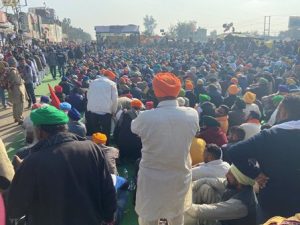India Should Repeal New Farm Laws, Say International CSOs Led by ILC
Together with its member organisations in India, the International Land Coalition Asia has strongly urged the Government of India to immediately repeal the three recently passed agriculture laws.
In solidarity with farmers, pastoralists and agrarian communities in India, the International Land Coalition Asia (ILC Asia), together with a host of organisations, urge the Government of  India to repeal the three new agriculture laws: the Farmers’ Produce Trade and Commerce (Promotion & Facilitation) Act 2020, the Farmers (Empowerment & Protection) Agreement on Price Assurance and Farm Services Act 2020, and the Essential Commodities (Amendment) Act; hereafter known as the APMC Bypass Act, ECA Amendment and Contract Farming Act. The organisations expressed their deep concern as the Indian government has passed legislations that would loosen rules around the sale, pricing and storage of farm produce. In the statement issued by the organisations stated that, the three laws, which were passed by the Indian parliament in September 2020, seek to alter the legal framework of India’s agricultural policies that would disadvantage smallholder and marginal farmers in India. The laws would allow farmers to sell crops to buyers beyond government-regulated wholesale markets, where farmers are assured of a minimum price. Smallholder and family farmers fear the changes will dismantle the minimum support price (MSP) system, leaving them vulnerable to competition from big business. According to the statement the Government of India had never involved farmers’ unions and leaders during the lawmaking process, nor were they involved in the pre- or post-legislative consultation process.
India to repeal the three new agriculture laws: the Farmers’ Produce Trade and Commerce (Promotion & Facilitation) Act 2020, the Farmers (Empowerment & Protection) Agreement on Price Assurance and Farm Services Act 2020, and the Essential Commodities (Amendment) Act; hereafter known as the APMC Bypass Act, ECA Amendment and Contract Farming Act. The organisations expressed their deep concern as the Indian government has passed legislations that would loosen rules around the sale, pricing and storage of farm produce. In the statement issued by the organisations stated that, the three laws, which were passed by the Indian parliament in September 2020, seek to alter the legal framework of India’s agricultural policies that would disadvantage smallholder and marginal farmers in India. The laws would allow farmers to sell crops to buyers beyond government-regulated wholesale markets, where farmers are assured of a minimum price. Smallholder and family farmers fear the changes will dismantle the minimum support price (MSP) system, leaving them vulnerable to competition from big business. According to the statement the Government of India had never involved farmers’ unions and leaders during the lawmaking process, nor were they involved in the pre- or post-legislative consultation process.
As a coalition of 54 civil society organisations in 13 countries in Asia, including India, ILC supports its members who have worked tirelessly to push for policies that prioritise the needs of smallholder farmers and those involved in the agriculture sector. The Acts show a sign of regression in protecting the interests of small and marginal farmers against those with power and resources. India’s vast farm sector makes up nearly 15 per cent to the country’s USD 2.9 trillion economy and employs around half of its 1.3 billion people, according to Reuters.
For days, tens of thousands of farmers have taken to the streets and demanded the government address their concerns seriously.
Talks between farmers’ leaders and Indian government officials have been arranged in the past few weeks but no solution has been made.
Also Read : Secure Land Rights Critical for Asia’s Rural Communities Threatened by COVID-19
The organisations in their statement stated that theyare deeply concerned with the government’s violent handling of the situation with the use of tear gas and water cannon to disperse protesters. Employing such a coercive instrument runs against the democratic value and the farmers’ freedom of expression. UN officials have also spoken up about the people’s right to demonstrate peacefully.
Together with their member organisations in India, they have strongly urged the Government of India to immediately repeal the three recently passed agriculture laws. The list of signatories includes: International Land Coalition Asia, Indonesia; Asia Indigenous Peoples Pact (AIPP), Thailand; Asian NGO Coalition for Agrarian Reform and Rural Development (ANGOC), Philippines; Land Forum India; ARNow!, Philippines; Partners of Community Organisations (PACOS Trust), Malaysia; JASIL Environment and Development Association, Mongolia; Consortium for Agrarian Reform (KPA), Indonesia; Rural Development Fund, Kyrgyzstan; Community Self Reliance Center (CSRC), Nepal; Association for Land Reform and Development (ALRD), Bangladesh; Abhiyan Nepal, Nepal; College of Development Studies (CDS), Nepal; Consortium for Land Research and Policy Dialogue (COLARP), Nepal; National Land Rights Forum (NLRF), Nepal; RMI – The Indonesian Institute for Forest and Environment, Indonesia; Indonesian Community Mapping Network (JKPP), Indonesia.
